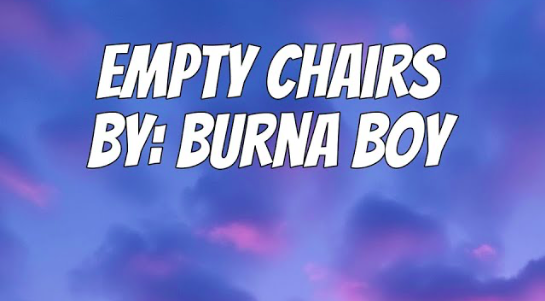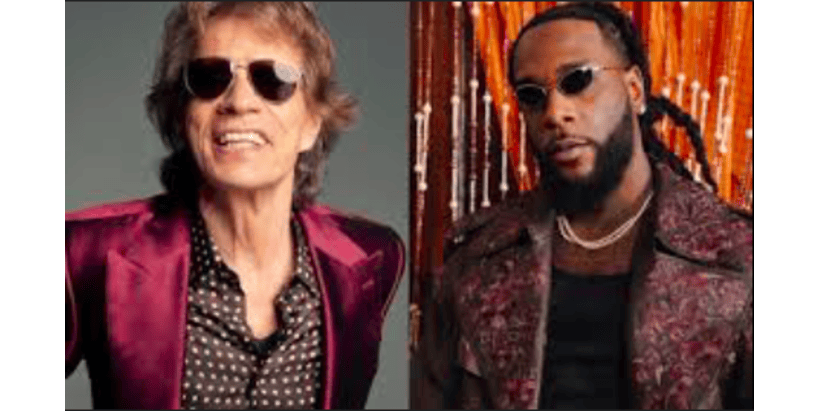In “Empty Chairs,” Burna Boy returns not just as an artist, but as a reflective force of truth, peeling back layers of ego, justice, war, and betrayal. Set against a haunting, slow-burning instrumental and elevated by the unexpected yet seamlessly blended chorus from rock legend Mick Jagger, the track emerges as one of Burna Boy’s most introspective and lyrically rich offerings. This is not just a song—it is an emotional reckoning, a meditation on the cost of power, the illusion of control, and the isolation that comes with fame and battle scars.
From the outset, Mick Jagger’s gravelly, mournful voice delivers the chorus like a slow exhale: “Am I the only one that’s sitting in this hot seat? / Am I the only one that’s listening to this heart’s beat?” This refrain anchors the song in emotional solitude. It’s a question that echoes through every verse—not just about power, but about consciousness. It immediately sets the listener up for an emotionally bare journey. While the world spins and the noise drowns out meaning, here’s a man left to hear only the rhythm of his own heart—a lonely, defiant beat.
Burna Boy’s first verse cuts with the kind of precision only his pen can deliver. “You might think that you’re sitting on a throne / But, to me, it’s just an empty chair.” The metaphor of the throne as an “empty chair” is quietly brutal. It dismantles the glamor and authority often associated with power and exposes its transient, often hollow reality. His “icy glare” and observation that “last time I checked, there was nobody there” are not just disses—they’re revelations. Power, in Burna Boy’s universe, is both a burden and a façade. The war metaphors—“this is warfare,” “troops on the loose”—reframe the music industry and life itself as battlefields, and Burna as a soldier who trusts no one outside his tight circle. “My circle don’t need no square” is clever, quick, and full of coded meaning: no outsiders, no fakes, no misalignment.
In the second verse, Burna shifts from the battlefield to the battlefield within. “I dey for the long ride / I get to push all my feelings, go one side.” There’s vulnerability in this line, even as it’s masked by stoic resolve. He paints himself as the archetypal African man—strong, unflinching, emotionally suppressed, not because he lacks emotion, but because his reality doesn’t allow its open expression. “I be real General, so I can’t cry” is heartbreaking in its truth. What does it mean to lead when softness is seen as weakness? What does it cost to be a “General”? These questions linger between the lines, even as he assures us that he has “don wise” and learned to mask his intentions.
Verse three brings with it a tonal shift—from internal battles to relational disappointment. “You might think that you’re sitting on a goldmine / But it will soon be revealed.” Here, Burna warns against illusion and entitlement. He speaks of waking someone from a dream, reminding them that he’s been a true friend—not the kind who flatters, but the kind who shows up in crisis. The line “What a friend for if not for inconvenience?” is one of the most piercing on the track. It reframes loyalty not as constant presence, but as timely presence. In a world where friends lie and enemies cheat, as Jagger repeatedly reminds us, Burna makes it clear that authenticity shows up under pressure—not in smiles, but in sacrifices.

The fourth verse is where the song deepens into full narrative form. “Was in the courtroom / It was me, the judge, and the jury, and some empty chairs.” This verse plays like a dramatic monologue, drawing from real-life courtroom drama or perhaps a metaphor for public judgment. “Empty chairs” here become symbols of absence—of people who should’ve stood by him, of witnesses, of family, of justice itself. “Then God showed me myself in the heavenly mirror” is a stunning image—a moment of spiritual reflection in a place of legal condemnation. This isn’t just a man on trial in court; it’s a man on trial in life. The sudden appearance of “Grandma I see there” evokes ancestral connection and a moral compass—another grounding moment in a song that continually shifts between external battles and internal reckonings.
In the fifth verse, Burna takes on systemic issues with sharp sociopolitical commentary. “This world na housing scheme / If you poor, you be victim of profiling.” Here, Burna lays out a scathing critique of inequality. The juxtaposition of the housing scheme—a space that should represent community and safety—against profiling and poverty, exposes the failures of societal structures. Then he flips the script: “If you no be politician, and you manage get rich / Them go turn you to victim of society.” Burna knows firsthand the suspicion that greets success in Nigeria—especially when it isn’t backed by political affiliation or establishment ties. He paints his enemies as no longer physical threats but digital ones—“on the internet or the blogs”—and at the very end, even in his sold-out shows, “looking for empty chairs.” That last line is powerful: a sold-out arena with enemies still searching for signs of weakness. It’s both defiant and weary. Fame, after all, is never without shadows.
The interlude adds a spiritual, almost gospel dimension. The call-and-response choir pleads for freedom, for the breaking of invisible chains. “(How do we) free up and break these chairs?” This moment stretches the metaphor further. The “empty chairs” are no longer just about power or absence. They become prisons. Constraints. Symbols of what we must overcome to truly be free—psychologically, emotionally, spiritually.
Finally, the chorus returns one last time. Jagger’s voice now feels heavier, more urgent: “Everyone around me is just so indiscreet.” The emotional weight that began in quiet introspection now spirals into frustration. The heart is still beating, but the world is louder, messier, more treacherous. Trust has eroded. Friends and enemies blur.
In totality, “Empty Chairs” is a triumph of lyricism and collaboration. Burna Boy and Mick Jagger are an unexpected but electric pairing—one steeped in African storytelling and rhythmic command, the other a global rock icon who adds gravitas and cross-generational appeal. Together, they don’t just make music—they deliver testimony.
This song is a war diary, a spiritual lament, a poetic courtroom sketch, and a socio-political critique all at once. It touches on loneliness, justice, betrayal, trauma, loyalty, and resilience. Few artists today can weave personal vulnerability with sweeping cultural commentary as seamlessly as Burna Boy. With “Empty Chairs,” he doesn’t just claim his seat at the table—he questions the very structure of the room.
Added by
Lyricssphere
WRITE A COMMENT
WRITE A COMMENT


vinlain fribet_gbmt
July 23, 2025 at 11:10 am
винлайн новая акция winlayne-fribet2.ru .
İçerenköy su kaçak tespiti
July 23, 2025 at 12:00 pm
İçerenköy su kaçak tespiti İşlerini hızlı ve temiz yaptılar, çok memnun kaldım. https://sociol.co/read-blog/7879
1win_ubpi
July 23, 2025 at 12:33 pm
скачать 1win на айфон https://www.1win3066.ru
Kypit KvarcVinil_muMt
July 23, 2025 at 2:20 pm
Кварц виниловый покрытия купить http://napolnaya-probka1.ru .
mostbet_bjmi
July 23, 2025 at 3:19 pm
мостбет официальное приложение мостбет официальное приложение
rusFrumP
July 23, 2025 at 5:06 pm
Недавно столкнулся с похожей ситуацией, и вот что помогло:
По теме “musichunt.pro”, там просто кладезь информации.
Ссылка ниже:
https://musichunt.pro
Всем удачи и хорошего дня!